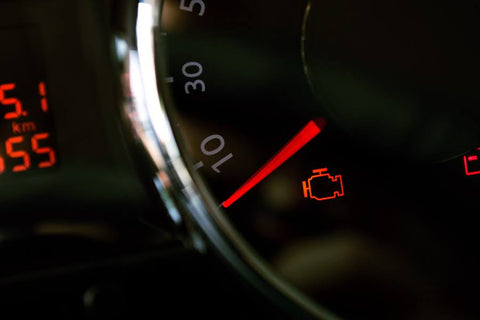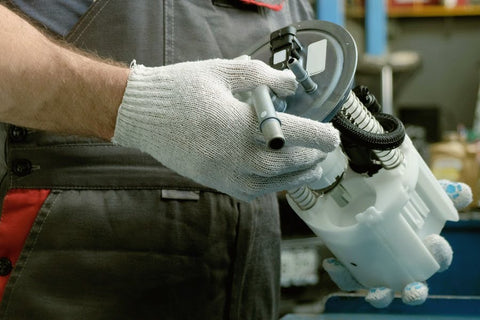When your car's dashboard suddenly lights up with the check engine light, it can be a source of immediate concern. Many drivers are left wondering whether and how can a faulty fuel pump trigger the check engine light.
In this article, we delve into the relationship between a faulty fuel pump and the activation of the check engine light, providing insight into how these two components of your vehicle are interconnected. By exploring the symptoms, diagnostics, and solutions related to this issue, we aim to equip you with the knowledge needed to address such a situation should it arise.

Source: shutterstock.com / Photo Contributor: Daniel Krason
Can a Faulty Fuel Pump Trigger the Check Engine Light?
A faulty fuel pump has the potential to activate the check engine light. Several typical indicators signal a failing fuel pump, such as:
- Engine sputtering or stalling – a struggling fuel pump may cause intermittent fuel delivery, leading to engine hesitation, sputtering, or even stalling while driving.
- Difficulty starting the engine – a weakened fuel pump may struggle to provide sufficient fuel pressure during startup, causing extended cranking times or difficulty starting the engine.
- Loss of power during acceleration – insufficient fuel delivery can result in a noticeable loss of power, significantly when accelerating or climbing hills.
- Surging or bucking – fluctuations in fuel pressure may lead to erratic engine behavior, such as surging or bucking while driving.
- Unusual noises – a failing fuel pump may produce unusual noises, such as whining, humming, or whirring, which can be audible from the vehicle's rear.
- Overheating – A failing fuel pump can sometimes overheat, leading to engine overheating issues or even causing the pump to fail.
- Check engine light illumination – as mentioned, a malfunctioning fuel pump can trigger the check engine light, signaling a fuel system problem requiring attention.
How fuel pump issues trigger the check engine light
The relationship between fuel pump issues and the activation of the check engine light in a vehicle is often a direct consequence of the fuel delivery system's crucial role in engine performance. Here are instances where a faulty fuel pump can trigger the check engine light:
- Fuel pressure irregularities – a failing fuel pump might need to help maintain the correct fuel pressure required for efficient engine operation. If the pressure falls outside the expected range, sensors in the fuel system can trigger the engine light to indicate a potential issue.
- Emission control – the fuel pump's role in maintaining the proper air-fuel mixture is vital for emission control. If the pump malfunctions and disrupts this balance, it can lead to emissions irregularities.
- Engine performance problems – a faulty fuel pump can cause engine performance issues like misfires or stalling. The vehicle's systems can detect these abnormal behaviors as a warning to the driver.
- Intermittent problems – a failing fuel pump might sometimes cause intermittent issues that don’t immediately trigger the check engine light but lead to pending diagnostic trouble codes that indicate a developing problem.
- Fuel system monitoring – modern vehicles constantly monitor various aspects of the fuel system. Any deviations from expected parameters detected by sensors monitoring fuel pressure, fuel mixture, or system performance can activate the engine light.
Other factors influencing the check engine light
Accurate diagnosis is crucial to address specific issues triggering the check engine light. Other factors, such as sensor malfunctions or exhaust problems, can influence the check engine light to light up. To distinguish fuel pump issues, focus on symptoms like erratic engine performance, misfires, or unusual noises.
Additionally, seeking professional injection pump repair when necessary can significantly contribute to resolving underlying fuel system concerns that might trigger the check engine light. Finally, you may have to buy a fuel injection pump and replace it.
Diagnosing and Resolving Fuel Pump-Related Check Engine Light
Steps to diagnosing a faulty fuel pump
- Check the fuel pressure in the fuel rail by using a fuel pressure gauge. If the pressure is too low, then the reason may be a bad fuel pump.
- Listen to the fuel pump by removing the fuel cap and placing it near your ear. Check for buzzing or humming – if there’s no buzzing or humming, the fuel pump may not be working.
- Check the fuel pump relay that controls the fuel’s pump supply.
- Check if the fuel filter is clogged.
Potential solutions for fuel pump issues
If you are experiencing issues with your fuel pump to the point that you can no longer drive your car, you’ll want to contact a reputable mechanic to fix any underlying issues to get your car up and running. But, in case you are in the middle of the road and the fuel pump fails, you’d want to opt for a quick, temporary fix to get you on the road until you find a more permanent solution.
If you have prior knowledge of car parts, inspect fuel lines for leaks, kinks, or obstructions affecting fuel delivery. Then, you’d want to swap the fuel pump relay with a similar relay in the vehicle’s relay box. However, keep in mind that this is only a quick fix until you can drive yourself to the mechanic.
For a permanent solution, we’d recommend replacing the fuel pump altogether. Although costly, it will resolve the issue permanently. Or you could just repair the fuel pump if it requires minor repairs. You may need to clean or replace the fuel filter to ensure proper fuel flow. Compared to a complete change of a fuel pump, a fuel pump repair is more cost-effective.
Importance of professional assessment and repair:
- Professionals use advanced diagnostic tools to identify fuel pump issues accurately;
- Trained technicians possess the expertise to address complex fuel system problems effectively;
- Preventive maintenance by professionals helps identify and resolve issues early, preventing further damage;
- Quality replacement parts and adherence to manufacturer specifications ensure the longevity of repairs;
- Professional repair, including resetting trouble codes, is essential for safety, reliability, and optimal vehicle performance.

Source: shutterstock.com / Photo Contributor: Palitsyn Evgenii
Conclusion
The relationship between a faulty fuel pump and the check engine light activation is a critical aspect of vehicle maintenance. As explored, understanding the potential impact of a malfunctioning fuel pump on this warning indicator is vital for prompt diagnosis and resolution.
By recognizing the symptoms, utilizing diagnostic tools, and seeking professional assistance, you can effectively address the question, can a faulty fuel pump trigger the check engine light? Proactive attention to such issues ensures not only the health and longevity of your vehicle but also promotes safer and more efficient driving experiences.



